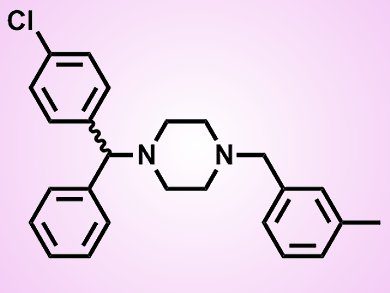Cells control energy production and redox balance through mitochondrial respiration, a set of reactions that convert nutrients into adenosine triphosphate. Although numerous pathological conditions, such as cancer and neurological diseases, are associated with abnormal mitochondrial respiration, drugs able to safely modulate this process are still lacking.
Accdng to Vishal Gohil, Massachusetts General Hospital, Boston, USA, and colleagues, meclizine (pictured), an antihistaminic used against nausea and vertigo, targets mitochondrial respiration through an indirect mechanism. The scientists discovered that meclizine is a noncompetitive inhibitor of phosphoethanolamine cytidylyltransferase (PCYT2), an enzyme that converts phosphoethanolamine into cytidine diphosphate ethanolamine. As a consequence, meclizine induces the accumulation of phosphoethanolamine, a metabolite that in turn inhibits mitochondrial respiration.
Thus, meclizine might be an attractive drug to treat disorders of energy metabolism.
- Meclizine inhibits mitochondrial respiration through direct targeting of cytosolic phosphoethanolamine metabolism,
V. M. Gohil, L. Zhu, C. D. Baker, V. Cracan, A. Yaseen, M. Jain, C. B. Clish, P. S. Brookes, M. Bakovic, V. K. Mootha,
J. Biol. Chem. 2013.
DOI: 10.1074/jbc.M113.489237




